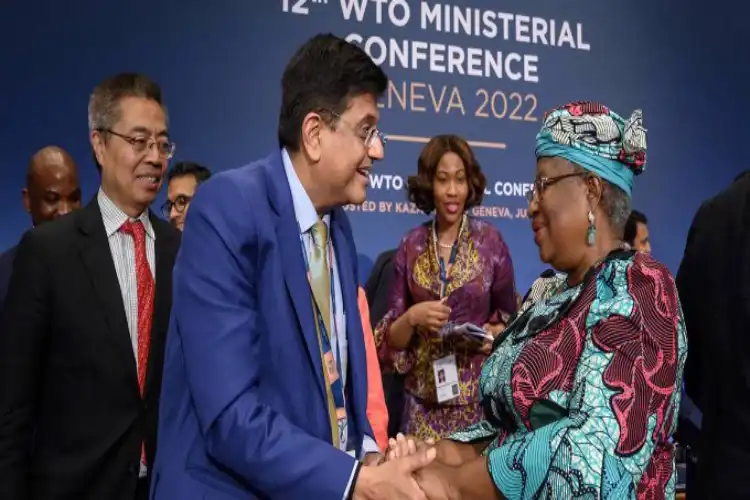
 Sushma Ramachandran
Sushma Ramachandran
Much was expected from the 12th ministerial conference of the World Trade Organisation held in mid-June after a gap of five years owing to the pandemic. It did not lack the usual midnight drama of negotiations that normally accompanies the multilateral trade body’s biannual meetings and was even extended by a day. But for a change, it ended up taking some firm decisions. It is after nine years that the 164-member organization has been able to conclude a conference with some concrete outcomes.
They were not completely favorable for India though Commerce and Industry Piyush Goyal described the meeting as a spectacular success. It was a mixed bag of results but probably for the first time, India became a deal maker instead of a deal-breaker. In the past, Indian Commerce Ministers like Murasoli Maran and Arun Jaitley have staunchly refused to budge on key issues ensuring that the WTO meetings have ended in a deadlock several times. This is because consensus is a basic tenet of the institution. All members have to agree to a decision before it is included in the final declaration. This time around, however, India compromised on some of its proposals and thus enabled the decision-making process to go forward.
One of the long-pending areas on which agreement was reached was fishing subsidies. The new pact bans any subsidy for illegal, unreported, and unregulated fishing with a two-year exemption for developing countries like India within their exclusive economic zones of the sea extending up to 200 miles from the coastline. It also restricts fishing in overfished stocks with a two-year relief for poorer countries. India’s proposal for a 25-year transition period for developing economies was not agreed to but it was able to ensure that subsidies were retained for small-scale artisanal fishing.
The fisheries agreement which has been debated for 21 years must be viewed in the context of the huge subsidies doled out by rich countries which contribute to overfishing. Estimates are that 35 billion dollars of subsidies are given annually of which 20 billion dollars support overfishing.
On the much-awaited patents waiver for Covid-19 vaccines, treatments, and diagnostics, there was considerable disappointment among activists over the limited agreement reached on the issue. The original proposal made by India and Japan included not just vaccines but drugs and diagnostics needed to tackle the pandemic. It must be recalled that the patent waiver proposal has taken over eighteen months to reach the stage of being considered formally by the ministerial conference. It was in October 2020 that India and South Africa submitted a scheme for a waiver for all WTO members on the implementation of certain provisions of the intellectual property rights agreement, TRIPS, to Covid 19. A revised plan was put forward by 62 co-sponsors in May last year including India, South Africa, and Indonesia. This envisaged that the waiver should be in force for at least three years from the date of the decision on the matter. It also covered health products and technologies under its purview. In this context, it pointed out that Covid treatment involves a range of goods and intellectual property issues may arise concerning the products and technologies as well as their materials, components, and means of manufacture.
In the final agreement, the waiver is only confined to vaccines. It has been agreed to temporarily waive intellectual property patents on Covid 19 vaccines for five years so they can be manufactured without any problems in other countries. Therapeutics and diagnostics have not been included in the waiver, which has been a big disappointment for poorer countries. Given the current over-supply of vaccines, the waiver may not be of great significance immediately but is bound to be beneficial in the long run. On the plus side, it has been agreed that the issue of therapeutics and diagnostics will be revisited after six months.
There was also little progress on key issues related to agriculture which have in the past been debated fiercely by developing countries led by India. It has been seeking to allow government-to-government sales of food grains kept in public stockholding programmes such as for the public distribution system. This proposal was not agreed to because the sale of subsidized grains could distort global food prices.
Another longstanding issue that has been pushed repeatedly into the background at ministerial conferences has been the need for a permanent solution on public stockholding for food security. Subsidies for developing countries are currently capped at ten percent of the value of production. As of now, these are covered by what is known as the “peace clause”. In case India’s food subsidies cross this level, they are protected from action against other WTO members. The subsidies are critical as these are meant to provide support to farmers through the minimum support price programme as well as to acquire and release grains to weaker sections of society. India has already invoked the peace clause twice when the subsidy level was breached, the last time being during the pandemic when higher support was needed for the food security programme.
The need for a permanent solution has once again been pushed forward till the next ministerial conference, which delays the issue for another two years.
India along with other developing countries also sought an extension of the moratorium on customs duties on e-commerce transactions. This includes digitally trade goods and services. It had been argued that developing countries had lost a potential tariff revenue of about 50 billion dollars on imports from only 49 digital products over the period from 2017 to 2020. This moratorium had been imposed in 1998 and has been regularly extended since then. But once again the conference decided to continue the moratorium till the next conference. In other words, countries like India will continue to lose revenue on such transactions at least for the next two years.
Also Read: ICRA forecasts optimistic growth despite global heatwaves
The 12th ministerial conference has thus been a mixed bag for this country. It has been successful in the areas of fisheries subsidies and the patent waiver for vaccines, but not so much on other key issues like food subsidies and e-commerce taxation. Even so, the very fact that the conference was able to achieve major agreements for the first time in nearly a decade has meant that it is certainly a milestone for the WTO.
